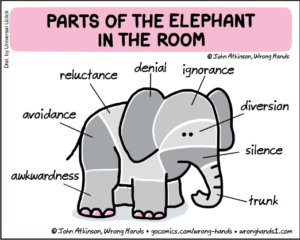What is the Elephant in the Room?
The elephant in the room: when there’s an important or enormous topic, question or issue that is obvious or that everyone knows about but no one mentions or wants to discuss because it makes at least some of them uncomfortable, embarrassed, inflammatory, or dangerous.
In substance abuse, this phrase usually means someone in our family, at work, or in our friend groups is experiencing significant problems. The problems don’t go away and usually get worse. All kinds of problems emerge; they may be health-related with questionable reasons, relationship issues with unusual behaviors, or financial difficulties with borrowing and general insufficient resources.
The individual seems to have reasons for these problems, but they are always changing or seem suspicious. We might be aware they drink or use a drug, but we don’t to know to what extent. We suspect they are hiding or minimizing their using. And if we bring it up, it only causes tension and more problems.
So, there’s the “Elephant in the Room.”
The Revolving Door
The person caught up in these problems sometimes doesn’t make the connection that their substance use is really the core issue, or that their use makes everything worse. In fact, they often see their using as their only way to cope with all of their problems. The drinking or drugs serve as their solution, and if you bring up their using, they become defensive and may even blame everyone else for their problems. This is called a “revolving door” problem. The more the using individual feels pressured or stressed, the more they turn to their substance solution, which in turn causes only more stress. If something’s going to change someone needs to take the chance and stick their foot in to stop the revolving door from continuing to turn.
Break the Cycle
This is when an intervention is needed to break the cycle and stop the revolving door. An intervention works best when several loved ones come together to discuss a common goal and method to directly address the problem with the using person. An intervention can be held with an employer, family members, or friends. The legal system sometimes provides a less compassionate intervention when the user is arrested or an involuntary commitment order is issued. Health issues and a strong message from a trusted physician can also work.
Once the elephant in the room is exposed, there needs to be direct, accountable action. The plan should include an immediate resource where the identified user can be assessed by a professional. If substances are suspected as a core issue, an appointment with a licensed and accredited substance abuse treatment facility or professional needs to be made. It should be emphasized to the identified user that they may share with a therapist openly and with confidentiality. This means whatever they may discuss is private and can only be told to others after consent is obtained.
Come to Believe
Hopefully, through the intervention and professional assessment, the identified user has a “come to believe” moment, and they are open to taking any recommendations that are made. However, this is not always the case. Backpedaling and less than honest self-assessments are common stumbling blocks; the user may again begin to withdraw. This is when the family or others need to be firm in their commitment to keep the focus on the user getting professional help.
We’ll Help You Address the Elephant in the Room
South Miami Recovery can help the family and others from the beginning of looking for help by answering questions, checking insurance coverage and most importantly by providing and planning an intervention if necessary. Contacting South Miami Recovery is only a phone call away and you will always speak directly to a professional. If South Miami Recovery is not the right fit, we will direct and coordinate a referral for you.
